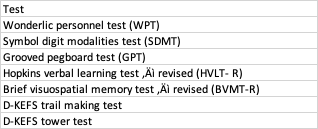The average age of physicians in the US is increasing, and there is ample evidence that cognitive impairment increases with age, as well as do adverse patient outcomes. It has been suggested that physicians of a certain age undergo periodic screenings for cognitive decline.
However, Primary Care Physicians (PCP), as well as many highly trained individuals, do better on Mini Mental Status Exams (MMSE) than their non-professional peers. I believe that's in part because PCPs use one of the many mini-mental status exams frequently enough to have the answers and the mechanics of the questions memorized.
It is a test that has become one of the most widely used internationally for the diagnosis and clinical prognosis of cognitive impairment, mainly in elderly patients.
Yale requires cognitive testing in physicians 70 years old and above, but the (secret) test is only 16 items long. The MMSE and the Montreal Cognitive Assessment (MoCA) exams each have 30 items. Regardless of which one physicians use, they are basically the same. Having administered these tests for at least 5 years in practice, these tests were committed iron clad in my memory. I believe a physician would need to be severely impaired by the time they fail either of these tests. Extensive neuropsychiatric exams are just more of the same.
The best paper I could find had suggestions but no details.
Is there any exam that measures cognitive impairment in physicians sensitively?
Sorry about the tag; neither cognition nor competency is a tag here. Also, please know that I am totally in favor of mandatory testing. But it should be sensitive, i.e. detect cognitive impairment before patients start to suffer. There's a difference between malpractice caused by hubris and cognitive impairment.
